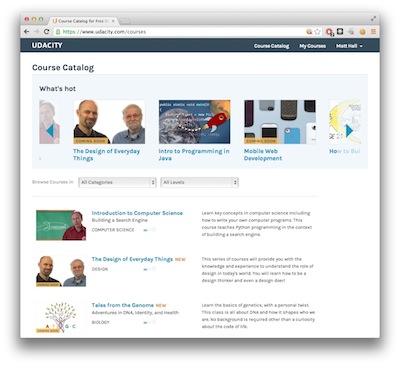Back to school
/My children go back to school this week. One daughter is going into Grade 4, another is starting kindergarten, and my son is starting pre-school at the local Steiner school. Exciting times.
I go all misty-eyed at this time of year. I absolutely loved school. Mostly the learning part. I realize now there are lots of things I was never taught (anything to do with computers, anything to do with innovation or entrepreneurship, anything to do with blogging), but what we did cover, I loved. I'm not even sure it's learning I like so much — my retention of facts and even concepts is actually quite bad — it's the process of studying.

Lifelong learning
Naturally, the idea of studying now, as a grown-up and professional, appeals to me. But I stopped tracking courses I've taken years ago, and actually now have stopped doing them, because most of them are not very good. I've found many successful (that is, long running) industry courses to be disappointingly bad — long-running course often seems to mean getting a tired instructor and dated materials for your $500 per day. (Sure, you said the course was good when you sis the assessment, but what did you think a week later? A month, a year later? If you even remember it.) I imagine it's all part of the 'grumpy old man' phase I seem to have reached when I hit 40.
But I am grumpy no longer! Because awesome courses are back...
 So many courses
So many courses
Last year Evan and I took three high quality, and completely free, massive online open courses, or MOOCs:
- Udacity CS 101 — Introduction to programming, with David Evans of UVa
- Udacity CS 253 — Web development, with Steve Huffman of Reddit fame
- Udacity EP 245 — How to build a startup, with Steve Blank
There aren't a lot of courses out there for earth scientists yet. If you're looking for something specific, RedHoop is a good way to scan everything at once.
- Seismic waves tutorial — 8 minutes — Khan Academy
- Our energetic earth — 12 hours — Bryan W. Karney with 2 students, University of Toronto, via edX
- Discrete time signals and systems — 80 hours — Richard Baraniuk, Rice University
The future
These are the gold rush days, the exciting claim-staking pioneer days, of massive online open courses. Some trends:
- Udemy is one of the first platforms allowing anyone to offer courses — a survival of the fittest approach to quality.
- Google recently open-sourced its course-building platform, very exciting for all educators and trainers.
- Udacity has already experimented with accredited courses, and is now offering a Master of Computer Science degree, awarded by Georgia Tech, for only $7000.
There are new and profound opportunities here for everyone from high school students to postgraduates, and from young professionals to new retirees. Whether you're into teaching, or learning, or both, I recommend trying a MOOC or two, and asking yourself what the future of education and training looks like in your world.
The questions is, what will you try first? Is there a dream course you're looking for?









 Except where noted, this content is licensed
Except where noted, this content is licensed